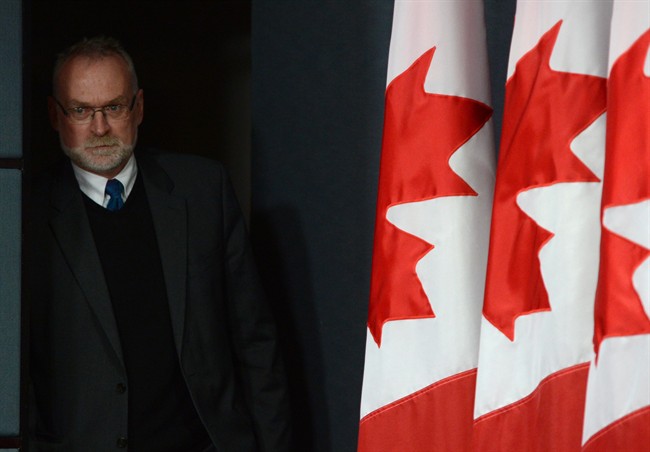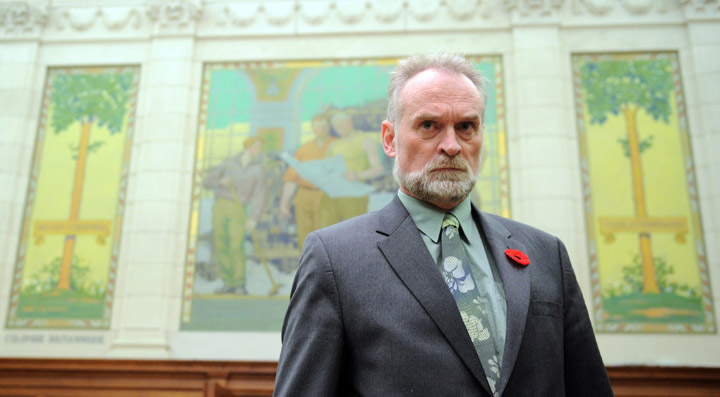This summer, we spoke with Canada’s officers of Parliament. We profile each in an eight-part series. Read them all here.

They have become heroes in the Canadian landscape.
From the sponsorship scandal to the estimated costs of the F-35 fighter jets, the auditor general is perhaps the most well-known of the federal watchdogs, responsible for some of the most charged and explosive stories out of Ottawa.
But the country’s current top spending watchdog, Michael Ferguson, said he doesn’t care if his becomes a household name.
“Really, what matters is that people have confidence in the work of the Office of the Auditor General,” Ferguson said, sitting back in an armchair by a coffee table in his Ottawa office. “It doesn’t matter to me whether people know who I am or not.”
His legacy, could he choose, would be simply that he leaves Canadians with at least the same level of confidence in the work of his office as they had when he came into the position in November 2011.
But before Ferguson was even able to begin proving his merit in the high-profile position, he found himself in the eye of a political and media firestorm.
Clear across the country, newspapers were running critical columns and opposition MPs were denouncing the Conservative government’s nomination of Ferguson.
- Alberta to overhaul municipal rules to include sweeping new powers, municipal political parties
- Canada, U.S., U.K. lay additional sanctions on Iran over attack on Israel
- Trudeau says ‘good luck’ to Saskatchewan premier in carbon price spat
- No more ‘bonjour-hi’? Montreal mayor calls for French only greetings
Their issue: he was a unilingual anglophone.
Officers of Parliament are accountable to parliamentarians. The expectation is that any MP or senator who needs to speak with them can do so easily, in their language of choice. In fact, the job posting for auditor general stipulated candidates be bilingual.
As the criticism swirled around him, however, Ferguson was staid. He went about his business of appearing before parliamentary committees, tabling reports and speaking with journalists.
The man who had served as New Brunswick’s comptroller, auditor general and deputy minister of finance said he knew it was coming.
“It certainly was not a surprise,” he said, reflecting on the year from when he was first selected until he was officially nominated—face-to-face interviews, having his capacity to learn French verified twice and undergoing a psychometric test.
“There were all kinds of different points when I could have said, ‘you know what? This isn’t worth it,'” he said. “But every time I was asked to do something else—an interview, some testing, or whatever, every time my answer to myself was, ‘yes, I want to do that.'”
Each test, each interview could have provided a point for Ferguson to doubt whether he truly wanted the position and the scrutiny that would inevitably come, he said. Rather, each test and each interview provided confirmation.
Departments sometimes ‘overly optimistic’
Backed up by an army of about 600 staff spread through offices across the country, Ferguson’s job is essentially to ensure proper financial management throughout the federal government.
He does this through regular audits of about 130 institutions, performance reports—the work that usually receives the most attention—as well as through audits of the government’s financial statements.
Ferguson finds no shortage of ways his office is of service to Canadians.
“Certainly, I think people in general want to know whether the government is delivering programs as efficiently as possible,” he said. “The government has limited resources and they’ve got to divide it up amongst programs. So people want to make sure the programs are operating in a way that the best service is being delivered for the amount of money that’s being put into it.”
One audit coming soon from Ferguson’s office will look at the oversight of rail safety at Transport Canada, a topic of high interest since this summer’s devastating and tragic train derailment in Lac-Megantic, Que.
This will not be the first time the Office of the Auditor General has looked into that agency.
A damning report released in December 2011 cautioned public safety is increasingly at risk because of a failure on the government’s part to provide and enforce sufficient oversight for transporting dangerous goods by road, rail, air and ship.
Weaknesses identified at Transport Canada included the fact it lacks the means to determine the extent to which companies transporting dangerous goods are obeying the rules for safely shipping them.
When that report was released, Transport Canada accepted all recommendations. The department responded with self-imposed deadlines, ranging from January 2012 to April 2013, to implement fixes to the problems.
Following the Lac-Megantic derailment, it was revealed that the federal department had quietly pushed those deadlines back and had yet to meet many.
“Certainly, our expectation is that the departments will do whatever they tell us they will do when they respond to our recommendations,” Ferguson said. “It will happen sometimes that when they’re giving us a response, that they’re being a little overly optimistic with their timelines.”
Asked whether this happens frequently, Ferguson said, “I don’t know that I’d say it was common, but I would say it’s not necessarily rare.”

A natural antagonist
Some might view the Office of the Auditor General, constantly peeking behind the curtains at federal institutions, as a natural antagonist to the government. Ferguson, however, does not.
“We’re not antagonistic as a goal. We will find some things, some times that are not working well, and that can be very uncomfortable for the government.”
Ferguson saw that almost immediately arriving on the federal scene.
Five months after he took over the office, Ferguson released his maiden report, revealing a $10-billion discrepancy between the internal and public estimates National Defence was using for the plagued F-35 fighter jet program.
The report indicated the government withheld information from Canadians and from Parliament. The stunning conclusion saw Prime Minister Stephen Harper freeze the budget for the fighter jet purchase and shift responsibility of the program to Public Works from Defence.
More recently, the auditor general has dived into an audit of individual senators’ expenses requested by the Senate itself, as the institution reels from the fallout of alleged misspending of taxpayer dollars by some of its members and a subsequent RCMP investigation.
Still, Ferguson said, the goal is not to antagonize, but rather to guard the office’s objectivity and independence from government. He isn’t blind to the fact his audits can cause tension, however.
Not ready to retire, but still no plans
“I mean, very few people like to be audited,” he said. “Very few people like it when someone comes in. They perceive it as maybe second-guessing some of their decisions or approaches to implementing programs.”
Almost two years into his appointment, Ferguson has released a legion of reports, and, as he continues his quest to become proficient in French, Parliament has passed a bill clearly stating that officers of Parliament must be bilingual at the time of their appointment.
“I think I’m making progress, but you have days where you think you’re making good progress and then you have days when you don’t know how much you’ve learned at all,” he said.
As his skills have improved, Ferguson has taken to listening to French radio, but there are hiccups.
“I’m taking it in in French, but then I’m storing it in my head in English. I have to figure out how to stop doing that,” he said. “It’s interesting sort of observing myself going through the process of trying to absorb another language.”
To the public, the beginning of Ferguson’s appointment appeared rather rocky. But behind the scenes, the long-time accountant calmly and comfortably slid into his new federal role, he said.
“All of the different pieces were the same … It’s just sort of magnified a bit,” he said. “There are more zeroes on the numbers here, there are more programs, the programs are maybe a bit more complex, the politics is more magnified.”
With only two years of his 10-year mandate under his belt, there is still time for Canada’s auditor general to become adept at French.
Looking forward to the end of his mandate, regardless of his language skills, Ferguson says he’s not sure what his next step will be.
“I guess the one thing I tell people is that my dad was a surgeon and then became a civil servant,” he said.
His father’s career shift came after years as a general surgeon during the 1960s when, as Ferguson put it, people didn’t realize driving with seatbelts was necessarily good and that driving drunk was not. That combination meant his father spent much of his time staring into the chests of drunk drivers who had their torsos crushed by steering wheels. At one point, he’d had enough.
Ferguson’s father would retire at 77, but eventually dig back into his medical years and establish a home-care hospital in New Brunswick—one of the first in the country—an undertaking for which he was awarded the Order of Canada.
“So I don’t yet have plans to retire at the end of this,” Ferguson says. “But I don’t know what else I might do.”



Comments